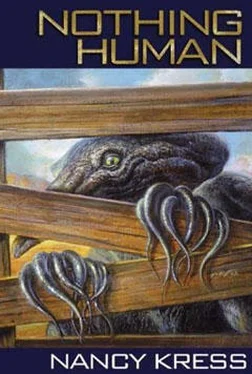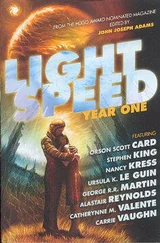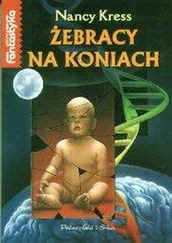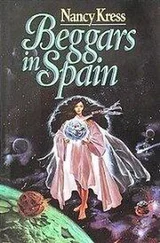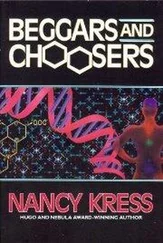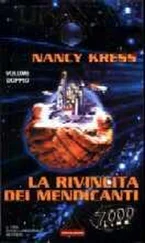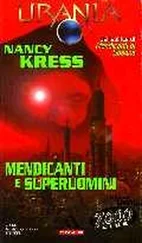“Well, that makes sense,” Emily said. “You start fooling around with avian pathogens, you could infect all birds and really ruin the ecology.” She fell silent, realizing that it was she who was not making sense.
“Aunt Emily, how many other people are left alive near us?” Kezia asked plaintively.
Uncle DeWayne said, “There are still some groups posting. A large one in Colorado, one in east Texas, one in the Arizona mountains. A few more, farther away. Then there are groups in the East, plus a few overseas. But there are fewer every month.”
Dr. Wilkins said, “Nobody else has the enhanced immune systems of our people.”
But not all enhanced equally, Cord thought. His generation, built genetically by the pribir, could probably survive in ways they didn’t even know about, as he had during the sandstorm four years ago. The men and women who had gone up to the pribir ship, including his mother, at least never got sick with anything. But DeWayne, Robin, and Dr. Wilkins had no engineered protection. Neither did Grandma Theresa’s children, Senni and Jody and Spring. Spring’s kids had boosted immune systems from their mother, Julie, but Jody’s and Senni’s children were vulnerable. Including Clari.
Cord went into their bedroom. Clari wasn’t there.
She, like Uncle DeWayne and Dr. Wilkins and Aunt Robin, wasn’t supposed to go outside. But sometimes she did anyway, dressed in a plastic rig Sajelle had created, with a mask over her face. Cord knew where to look for her.
The sun was setting in the west, fanning theatrical rays of gold and orange over a purple sky. A full moon shone gloriously on the eastern horizon. Over it passed momentarily the silent silhouette of a hawk. With the return of rain, some of the plants new since the warming had revived. Cord smelled the cool fragrance of sage, the stronger odor of cedars brought to him on a shifting breeze. Grandma Theresa had been buried under a stand of cedars, a quarter mile from the house.
Clari, in her weird plastic covering, stood in the shadow of the cedars, gazing at the stone marker. The bulge of her pregnancy made her look even more grotesque. How much longer? Two months, unless the baby came early. Clari, unlike the girls engineered by the pribir, carried only one child. Cord’s son.
He didn’t feel like a father. He felt like a boy looking at the girl he loved, who inexplicably was carrying around a hay bale under her smock.
“Clari,” he said softly.
“Hey, Cord.”
“Are you cold?”
“In this plastic? No.” She laughed, without pleasure.
“Are you… can I do anything for you?”
“Yes,” she said, which surprised him. He asked, often and helplessly, and the answer was always no.
“What? Anything, Clari, you know that.”
She didn’t answer. He peered at the semi-transparent face mask, but couldn’t make out her expression. Finally she said, “It’s going to sound terrible. I don’t mean to be gloomy or to upset you, but if… if anything happens…”
“What?”
“If anything happens while I’m in labor, would you please bury me and the baby here, next to Grandma?”
He didn’t understand why he felt anger. “Nothing is going to happen to you or the baby!”
“You don’t know that. It might. I’m not made like the other girls. And sometimes — ” She dropped her voice so low he could hardly hear her, ” — sometimes I hope it does.”
“Don’t say that! What’s wrong with you, to say that? I don’t want you to die!”
She clutched at his hand. “Don’t be mad, Cord. Please don’t be mad. It’s just that I don’t believe… everybody is so optimistic. They say we’ll get through this. But, Cord, almost everybody in the world is dead! Everybody! Don’t you think about that… a whole planetful of people just gone?”
Cord didn’t usually think about that, although he knew that others did. What good did thinking about it do?
She rushed on. “I have trouble believing this farm is going to make it when no one else did. And sometimes I think that if we’re all going to die anyway, I’d rather it happened to the baby now, before he’s properly born, so he doesn’t suffer. I don’t want him to suffer, Cord.”
So many conflicting feelings swamped Cord that he couldn’t answer. He didn’t have to. A figure came running toward them from the big house, calling, “Cord! Cord!”
“Who is it?”
“It’s Keith.” His brother tore up to Cord and Clari, and at the look on Keith’s face in the moonlight Cord’s chest tightened.
“Cord, come quick. It’s Mom. She’s sick!”
Lillie? Sick? They were none of them sick, that generation! “You’re lying!”
Keith didn’t even counterattack. “Come quick! Now!” And he was off, back to the house.
Cord ran after him, remembered Clari, stopped and turned.
“Go, go,” she said. “I’m coming.”
He raced away, leaving her lumbering after.
Lillie sat on the bed in her room at the big house. She didn’t look sick to Cord. Emily, masked, had just handed her a homemade plastic suit like the one Clari wore. Even through the mask Cord could see Emily’s fear. If Lillie could get sick, then any of her generation could.
“Mom?” Cord said from the doorway.
“Get out, Cord, and close the door,” Emily said. “I’m taking your mother down to my lab, in quarantine. You can talk to her there if you wear a mask.”
“I’m not going to get sick,” Cord said, before he thought. “I’m pribir-engineered from scratch!”
“Good for you,” Emily said acidly. “But it doesn’t look like the pribir knew what they were doing after all, does it? Lillie’s supposed to have a much boosted immune system, too.”
Not like mine, Cord didn’t say, because he was too worried about his mother. She smiled at him.
“I’m all right, Cord. Get out now and I’ll see you and Keith at the lab. Don’t let Kella come, though, or any of the pregnant girls.”
“They’re not coming, Lillie,” Emily said. “Cord, close the door.”
He did, feeling relieved. His mother didn’t look sick at all. Whatever it was, the pribir would have guarded against it. They wouldn’t let Lillie die. They were too good for that.
For the next two weeks, it looked as if Cord were right. Lillie started with merely a headache, which wouldn’t have even been noticed except that none of that group, the twenty-nine-year-olds, ever got headaches. And she couldn’t seem to sleep, not even fitfully. A few days later those symptoms disappeared, and Emily would have let Lillie out of quarantine if she and Scott hadn’t already discovered the problem.
“Oh my dear God,” Scott said.
“I found it on the Net medical library, what’s still functioning of the Net medical library, but I hoped I was wrong,” Emily said, white as bleached bone.
“No. You’re not wrong.”
“Can we—”
“No. I don’t know how to fight this in the brain, Emily. No one does. We’ll have to rely on Lillie’s own immune system.”
“What is it?” Kella demanded. “Tell me!”
Lillie’s two sons had waited outside Emily’s lab. They insisted on going with her to Dr. Wilkins in the big house where Kella, eight months pregnant, had joined them. The five people crowded into Dr. Wilkins’s little room, crushing each other between bed and crude dresser, knocking elbows into the enormous curve of Kella’s belly.
Dr. Wilkins said, “It’s an induced variant of a prion disease.”
Cord and Keith looked blank. Kella, visibly dredging her memory, said, “That’s… wait a minute… that’s a disease where a protein changes its form and it… does what?”
Emily said, “Clumps together in sticky, aggregate lumps that disrupt cell structure. And resists all efforts to destroy it. Lillie’s prion changes are in the brain, uninduced by her genes. Something else caused it.”
Читать дальше
